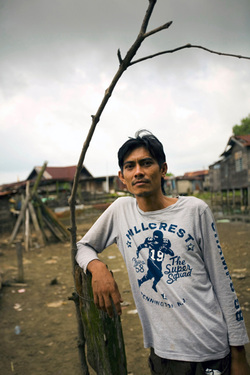A lifeline for Malaysian fishermen
 © International HIV/AIDS Alliance
© International HIV/AIDS Alliance
To
cope with the harsh realities of a life spent at sea, many fishermen use heroin,
making them particularly vulnerable to HIV infection. It is estimated that more
than one in 10 fishermen are living with HIV, over 20 times Malaysia's general
prevalence rate. Outreach workers from DiC Pahang are helping to reduce
the number of new infections and keep people healthy by providing clean
needles, condoms and advice on safer injecting. Thanks to grassroot schemes
such as this, new infections in Malaysia have halved since the peak of its
epidemic 10 years ago.
People who inject drugs routinely face stigma and discrimination. The local community equates drug use with HIV and as “there’s stigma around HIV, it makes it very hard for people who use drugs to be accepted,” says Zulkefi Abdulleadin, outreach manager.
The clients are aware of the judgements that are often made about them. Yie, 32, has been a fisherman since he was 15. “There are all these preconceived notions about drug users...but I do see some change of mindset since DiC Pahang began working here. We just want to be welcomed.”
In 2012 the International HIV/AIDS Alliance documented the work with the fishermen, which depicts a hard community, many of whom, like Yie, have worked on the boats from a young age. Those who are married and have children are the breadwinners for their families.
Ani, works at a local café. She is the owners’ grand-daughter. Ani is aware what the DiC outreach workers do and she is supportive. “My uncle was a drug user but he died. He did not have services available to him. I wish he had, that might have helped. Not all drug users are thieves. I believe this as my uncle was not a thief, I can personally attest to that. I think the programmes should go on.”
As well as the project itself reducing stigma locally, the photos and case studies attempt to challenge preconceptions of people who use drugs and bring these to a wider audience. The photos have been featured ‘in pictures’ on the BBC, exhibited on SocialDocumentary.net and used to highlight the work of the organisations involved through their websites and publications.
The work of DiC Pahang is supported through the Alliance’s five-country Community Action on Harm Reduction programme. In Malaysia the programme is supported by the Malaysian AIDS Council. Visit www.aidsalliance.org to see more Alliance's work.
People who inject drugs routinely face stigma and discrimination. The local community equates drug use with HIV and as “there’s stigma around HIV, it makes it very hard for people who use drugs to be accepted,” says Zulkefi Abdulleadin, outreach manager.
The clients are aware of the judgements that are often made about them. Yie, 32, has been a fisherman since he was 15. “There are all these preconceived notions about drug users...but I do see some change of mindset since DiC Pahang began working here. We just want to be welcomed.”
In 2012 the International HIV/AIDS Alliance documented the work with the fishermen, which depicts a hard community, many of whom, like Yie, have worked on the boats from a young age. Those who are married and have children are the breadwinners for their families.
Ani, works at a local café. She is the owners’ grand-daughter. Ani is aware what the DiC outreach workers do and she is supportive. “My uncle was a drug user but he died. He did not have services available to him. I wish he had, that might have helped. Not all drug users are thieves. I believe this as my uncle was not a thief, I can personally attest to that. I think the programmes should go on.”
As well as the project itself reducing stigma locally, the photos and case studies attempt to challenge preconceptions of people who use drugs and bring these to a wider audience. The photos have been featured ‘in pictures’ on the BBC, exhibited on SocialDocumentary.net and used to highlight the work of the organisations involved through their websites and publications.
The work of DiC Pahang is supported through the Alliance’s five-country Community Action on Harm Reduction programme. In Malaysia the programme is supported by the Malaysian AIDS Council. Visit www.aidsalliance.org to see more Alliance's work.

